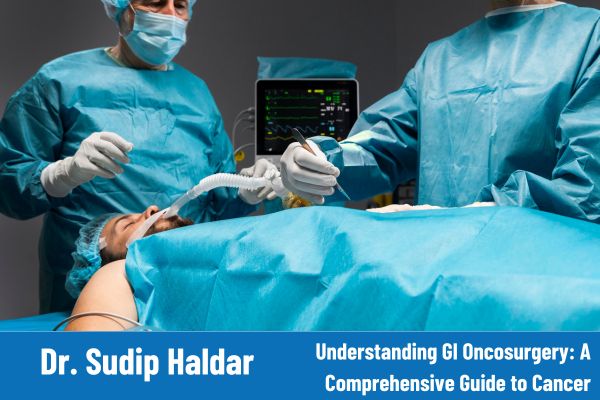Understanding GI Oncosurgery: A Comprehensive Guide to Cancer Treatment with Dr. Sudip Haldar
Gastrointestinal (GI) cancers, which include cancers of the colon, stomach, liver, pancreas, and esophagus, can be difficult to treat due to their complexity. However, GI Oncosurgery has emerged as a vital tool in the management of these cancers, providing patients with the best possible chance for recovery and long-term survival. Dr. Sudip Haldar, a leading expert in GI Oncosurgery, shares insights on the types of surgeries, their benefits, and how these procedures have evolved to enhance patient outcomes.
What is GI Oncosurgery?
GI Oncosurgery refers to the surgical management of cancers affecting the gastrointestinal (GI) tract. Surgical intervention is often crucial for removing cancerous tumors, preventing their spread, and alleviating symptoms. The main goal is to eliminate cancer while preserving as much healthy tissue as possible, ensuring the patient’s quality of life.
Types of GI Oncosurgery
GI Oncosurgery encompasses various surgical procedures tailored to specific cancer types. Some common surgeries include:
- Colorectal Cancer Surgery
Surgery for colorectal cancer often involves colon resection, which removes the part of the colon containing the tumor. In some cases, a colostomy may be necessary if part of the colon is removed. - Stomach Cancer Surgery
Gastrectomy, or the removal of part or all of the stomach, is commonly performed for stomach cancer. The procedure may involve reconstruction to maintain digestive functions. - Liver Cancer Surgery
Surgical treatment for liver cancer may include liver resection (removal of part of the liver) or liver transplantation in cases of advanced cancer or cirrhosis. - Pancreatic Cancer Surgery
Pancreatectomy, which involves the removal of part or all of the pancreas, is often recommended for pancreatic cancer, though only a small percentage of patients are candidates for surgery due to the late-stage diagnosis. - Esophageal Cancer Surgery
For esophageal cancer, the esophagectomy procedure removes the affected part of the esophagus and reconstructs it to ensure normal swallowing.
The Importance of GI Oncosurgery
The key to successful treatment in GI cancers is early detection. Once the cancer has been identified, GI Oncosurgery becomes the cornerstone of treatment, aiming to remove the tumor and prevent metastasis (spread to other organs). Surgical options often offer the best chance of curing cancer, especially when the disease is localized.
Moreover, in advanced cases where the cancer cannot be fully removed, surgery can help alleviate symptoms such as pain, obstruction, or bleeding. In some cases, palliative surgery may be recommended to improve the patient’s comfort and quality of life.
Minimally Invasive GI Oncosurgery
In recent years, minimally invasive GI oncosurgery has revolutionized the way GI oncologists approach cancer surgery. Using techniques such as laparoscopy or robotic surgery, surgeons can make smaller incisions, leading to:
- Less pain
- Faster recovery
- Shorter hospital stays
- Minimal scarring
Dr. Sudip Haldar has adopted these advanced techniques in his practice, offering patients faster recovery times and better overall outcomes. Minimally invasive surgery is particularly advantageous for patients who are frail or elderly, allowing them to recover quickly and return to their daily lives.
Recovery After GI Oncosurgery
Recovery after GI Oncosurgery varies depending on the type of surgery performed, the extent of cancer, and the patient’s overall health. However, most patients can expect the following:
- Hospital Stay: Depending on the procedure, patients typically stay in the hospital for several days.
- Dietary Adjustments: Following surgery, patients may need to follow a specialized diet to aid in digestion and recovery. A gradual return to regular eating habits is encouraged.
- Physical Activity: Light physical activity is encouraged post-surgery to improve circulation and prevent complications like blood clots.
- Follow-Up Care: Regular follow-up appointments with the surgeon and oncologist are essential to ensure proper healing and monitor for signs of recurrence.
Conclusion
GI Oncosurgery, under the expertise of renowned surgeons like Dr. Sudip Haldar, plays a critical role in the management of gastrointestinal cancers. Whether through traditional or minimally invasive techniques, the goal remains the same: to eliminate the cancer and improve the patient’s quality of life. Early detection and surgical intervention offer the best hope for patients, with continued advancements in surgery helping to further improve outcomes.
If you or a loved one is facing a GI cancer diagnosis, it’s crucial to seek expert consultation to discuss the most appropriate treatment plan tailored to your needs. Dr. Sudip Haldar and his team can provide compassionate care and cutting-edge surgical solutions for GI cancer treatment.

